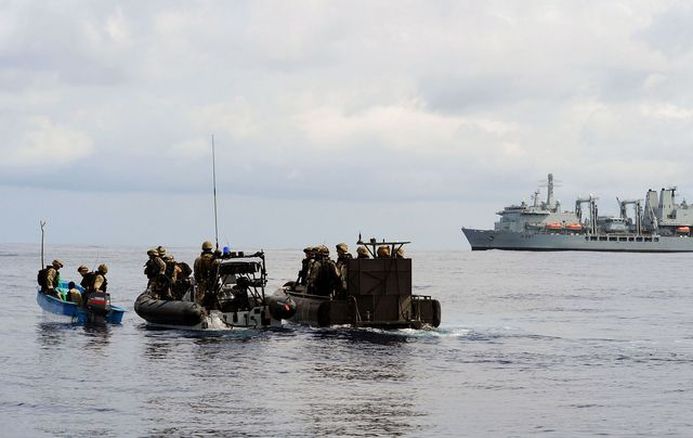
The ship was AVOCET belonging to Eagle Bulk Shipping, an American company. The security company has been identified as Trident Group of Virginia Beach, VA. The Bloomberg story tells us a lot we didn't know previously, but doesn't get into the weeds with regard to warning shots or escalation of force (EOF), because neither the shipping company nor the security firm would comment. The head of the security firm did say that he was "absolutely" satisfied that his company's operating procedures were legal.
There are a dozen ways to look at this situation, based on the video - but we can't really make any informed judgment without knowing more. For instance, EOF: were other defense measures taken prior to the shooting in the video? None were shown. If those were *warning shots* then I hope no one ever tries to warn me of something that way.
The Trident representative also said that an AK-47 round narrowly missed one of his men, indicating that the pirates were shooting back. In the video, with all the shooting from the ship's end, any shots from the skiff are drowned out, so we can't tell. And unless someone comes clean with a complete, unvarnished account of what really went down that day, we'll never know.
Most people I've talked to about this video admit to similar misgivings. But for all that, they feel that the pirates had it coming and wouldn't have been hurt if they hadn't been there. As a seaman, I tend to that view myself. But there's an unorganized, ad hoc tenor to the action in the video that looks like potential trouble to me.
I was a patrol boat crewman in Vietnam; as a military unit we operated under clear orders with regard to escalation of force. We never started in with gunfire, although we eventually had to resort to it more than once.
It seems to me that AVOCET's security guards (or the shipping company) should have included fixed EOF procedures and a few non-lethal warning measures in their arsenal - something like the water cannon shown in an earlier post (click "Piracy Water Cannon" in the Categories column) or a Long Range Acoustic Device (LRAD) that could penetrate the loud background noise in the skiff. Warning shots don't warn if the subject can't hear them. Deadly force should always be the last resort, not the first.
Fishermen may be in a similar type of boat, and fishermen may even carry guns. Unless you're sure you're dealing with pirates, you may end up killing innocent fishermen, as in the ENRICA LEXIE case (for background, see "Fishermen Shot", "Enrica Lexie Settlement" and "Enrica Lexie Released" in the Categories column). A sloppy response to a perceived pirate threat could land you in serious legal trouble.
The difference between my Navy experience and operations like these is oversight. We were under constant oversight, so far as our communications could provide it, and our operations also had to be reported in detail after the fact. Not to say that's a perfect or even a satisfactory system - atrocities happen in every war in spite of oversight.
But in the AVOCET case, we have the opposite of oversight - all concerned have clammed up tight. Maritime's governing authorities have no idea what went on. And this attitude is apparently widespread - according to the Bloomberg article some armed guard contracts explicitly require the shipowner not to report an attack.
This lack of transparency is bound to bite someone in the nether parts sooner or later. One could argue that it already has bitten ENRICA LEXIE's owners, as well as robbing two Indian families of their breadwinners.
The recently-issued IMO guidelines for armed guards are a start, but are non-binding, and regulations governing these sorts of things usually take years to be developed. Maybe the flag states could take it up individually, because lack of direction in this area could be costly. Armed guards have proven to be an effective anti-piracy measure; poor implementation and lack of transparency should not be allowed to diminish that effectiveness.
In the meantime, private security companies - along with their customers - might do well to agree on basic principles of conduct and EOF - and to be more transparent about their operations, not less.
As usual, we want to hear from you! Are you on the scene - have you worked on one of the 42,500 ships that transit the region yearly? Then you probably have strong feelings on this topic. Let us know how you see it!
 RSS Feed
RSS Feed